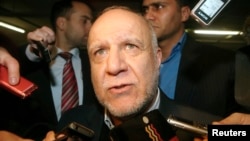Iran will convert more of its higher-grade enriched uranium into reactor fuel under an interim nuclear deal with six world powers, making the material less suitable for building atomic bombs, a diplomatic source said on Monday.
Iran and the United States, France, Germany, Britain, China, and Russia failed to meet a Nov. 24 deadline for resolving their dispute over Tehran's nuclear program. They gave themselves until the end of June for further negotiations.
It was the second time this year they had missed a self-imposed target for a comprehensive agreement to scale back Iran's nuclear program, in exchange for phasing out sanctions that are hurting its oil-dependent economy.
As a result, a preliminary agreement reached late last year, designed to buy time for the talks on a final settlement, will remain in force. Under its terms, Iran halted its most sensitive nuclear activity in return for limited sanctions easing.
Accordingly, Iran earlier this year eliminated its stockpile of uranium gas enriched to a fissile concentration of 20 percent, a relatively short technical step from weapons-grade material. A large part of it was processed into oxide.
When the deal was first extended in July, Iran undertook to move further away from weapons-usable material by converting 25 kg of the higher-grade uranium oxide - a quarter of the total - into nuclear fuel during the initial four-month extension.
The source, who declined to be named, said under the new extension Iran would continue this work and suggested about 5 kg would be converted per month. The details of the extended agreement have yet to be made public.
In July, a senior U.S. official said that once the oxide had become fuel plates for a Tehran research reactor, Iran would “find it quite difficult and time-consuming” to use it in any nuclear bomb “breakout scenario.”
Iran denies Western allegations that it has been seeking to develop the capability to build atomic arms, saying its nuclear program is a peaceful project to generate electricity.
Under the seven-month extension of the negotiations, Iran will receive about $700 million per month of its oil revenue frozen in banks abroad.











